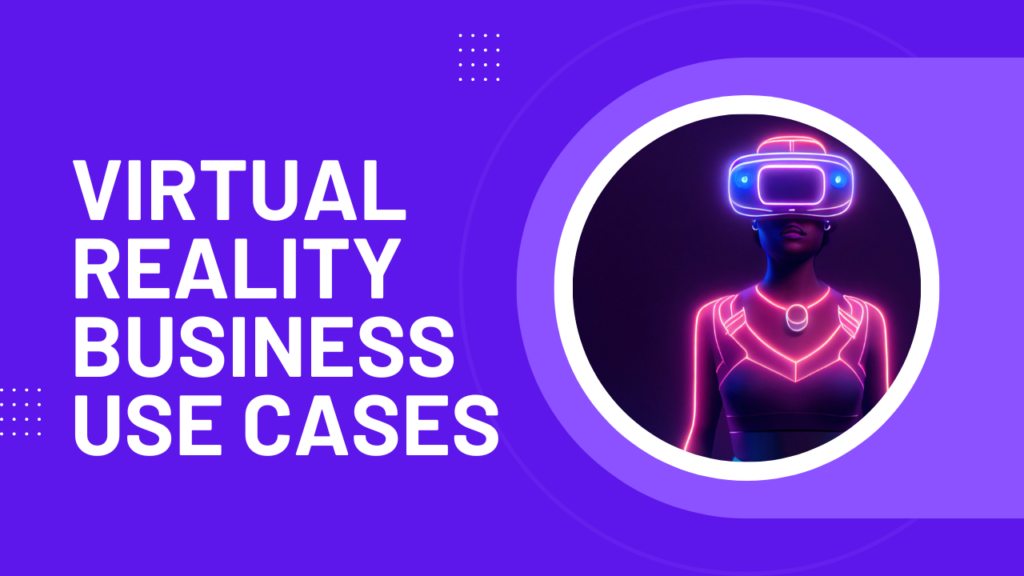Virtual Reality (VR) has come a long way since its inception in the gaming industry. Today, businesses from a variety of sectors are adopting VR technology to improve their operations and enhance customer experiences. From product development to employee training, VR has proven to be a powerful tool for businesses looking to stay ahead of the curve.
In this article, we’ll take a look at the top 10 virtual reality business use cases.
10 Virtual Reality Use Cases
Virtual Product Development
One of the most popular use cases of VR in business is virtual product development. With VR, companies can create virtual prototypes of their products, allowing them to test and refine their designs before committing to physical production. This saves time and money and ensures that the final product meets customer needs and expectations. For example, the automotive industry has been using VR for years to design and test new cars, while companies in the architecture and construction sector are using VR to create and test building designs.
Virtual Tours and Experiences
Virtual reality has transformed the tourism industry with immersive virtual tours of popular destinations. Companies like YouVisit and Expedia offer virtual tours of hotels, resorts, and tourist attractions, giving customers a preview of their destination before booking their trip. VR technology can also be used to create virtual experiences, such as skydiving, rock climbing, and even space travel, offering customers an experience they may not have been able to try otherwise.
Training and Simulation
Virtual reality has revolutionized employee training, offering a safe and controlled environment for employees to learn and practice new skills. For example, the military uses VR to simulate combat scenarios, while airlines use VR to train pilots and cabin crew in emergency procedures. VR training can also be used to simulate customer interactions, allowing employees to practice their customer service skills in a safe and controlled environment.
Virtual Retail and E-Commerce
Virtual reality is transforming the retail industry by offering immersive shopping experiences. Customers can browse and purchase products in a virtual store, allowing them to see products in 3D and better understand how they look and feel. For example, Ikea offers a VR app allowing customers to design and furnish their rooms, while Alibaba offers a virtual shopping mall with a more immersive shopping experience.
Healthcare
Virtual reality has the potential to transform the healthcare industry by offering immersive and interactive training for medical professionals and patients. Medical students can use VR to simulate surgeries and medical procedures, while patients can use VR to manage pain and anxiety. VR can also be used to treat phobias and mental health conditions, offering patients a safe and controlled environment to confront their fears.
Real Estate
Virtual reality is transforming the real estate industry by offering virtual tours of properties. Customers can take a virtual tour of a property, allowing them to understand its layout and features better before they visit in person. This saves time and offers a more immersive experience, allowing customers to get a better sense of the property before making a decision.
Read Also: Key Benefits of a Hybrid Work Model You Need To Know

Virtual Collaboration
Virtual reality transforms teams’ collaboration by offering immersive and interactive virtual meeting spaces. With VR, teams can meet and collaborate in a virtual space, allowing them to share ideas and work on projects in a more immersive and engaging environment. This improves communication and allows teams to work together more efficiently and effectively.
Event Management
Virtual reality can transform the events industry by offering immersive and interactive virtual events. With VR, companies can host virtual conferences, trade shows, and other events, offering attendees a more engaging and interactive experience. This saves time and money and offers a more accessible and inclusive experience for attendees who may not be able to attend in person.
Advertising and Marketing
Virtual reality is changing the advertising and marketing industry by offering immersive and interactive experiences for customers. Companies can use VR to create engaging and memorable experiences for customers, allowing them to interact with products more effectively. For example, Coca-Cola created a VR experience that allowed customers to experience the feeling of being on a rollercoaster while drinking Coca-Cola. VR advertising and marketing can also be used to create brand awareness and loyalty, offering customers a unique and memorable experience.
Customer Support
Virtual reality can transform customer support by offering immersive and interactive support experiences. With VR, customers can receive support in a virtual environment, allowing them to understand the issue and the solution better. For example, a telecommunications company could use VR to guide customers through setting up their router or troubleshooting an issue. VR customer support can also be used to offer a more personalized and engaging experience, improving customer satisfaction and loyalty.
Final Words
Virtual reality technology is transforming the way businesses operate, offering immersive and interactive experiences for customers and employees. From product development to customer support, VR has proven to be a powerful tool for businesses looking to stay ahead of the curve. As technology continues to evolve, we can expect to see even more innovative uses of VR in business in the future.

